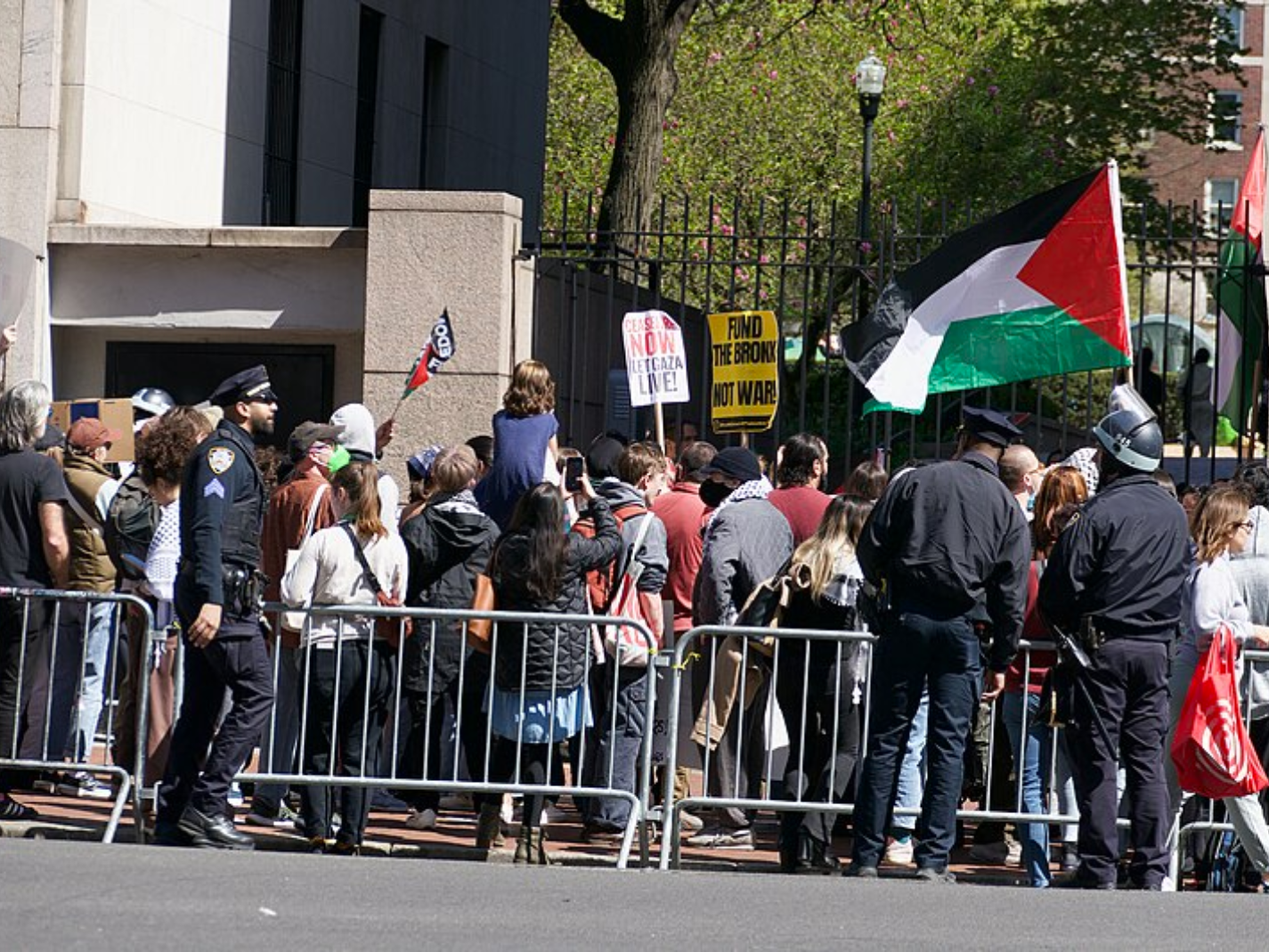
Author’s Note: This excerpt is from my weekly “Top of Mind” email, sent to subscribers every Thursday. For more content like this and to receive the full newsletter each week, sign up on Minding the Campus’s homepage. Simply go to the right side of the page, look for “SIGN UP FOR OUR WEEKLY NEWSLETTER, ‘TOP OF MIND,’” and enter your name and email.
It would be remiss for Minding the Campus not to address the recent surge of pro-Palestinian protests sweeping through colleges and universities across the nation.
Protests erupted at Columbia University in New York City on April 17, as pro-Palestinian students established the Gaza Solidarity Encampment on campus, demanding divestment from Israel. Video shows the encampment was swiftly dismantled by the New York City Police Department the following day.
Columbia University Apartheid Divest spearheaded the campus occupation in partnership with Students for Justice in Palestine and Jewish Voice for Peace. Within Our Lifetime also extended its support, while smaller pro-Israel counterprotesters also made their presence known, according to many reports. In response, the institution, among other actions, has adopted a hybrid learning model for the remainder of the semester—a method long associated with suboptimal learning outcomes for students.
Additionally, “The arrest of over 100 student protesters at Columbia University on April 18 has ignited solidarity protests at colleges nationwide, ranging from Yale University and MIT on the East Coast to Ohio State University in the Midwest and Stanford University and the University of California at Berkeley out west,” according to The Washington Post.
The widespread nature of these protests has captured negative media attention, even from outlets I would have expected to align with the protesters.
Lester Holt’s April 23 NBC News broadcast, for example, covered the protests extensively, spotlighting pro-Palestine encampments nationwide and the arrests of students and professors. In the segment—buried amidst coverage of Trump’s hush money trial—Holt interviewed FBI Director Christopher Wray, who stated that while the FBI respects the right to protest, they monitor threats of violence, acknowledging an uptick in threats of anti-Semitic violence.
While that alone is quite a bit of information to take in, there are still aspects of this discourse that merit further exploration.
Firstly, regarding the protesters at Columbia University, one must question the true effect of their efforts. Even if they were to succeed in persuading the university to divest from Israel, do they fully comprehend the minimal effect such a divestment would have on the institution?
According to Barron’s, “Israeli companies constitute less than 1% of the global stock market value. In 2023, Columbia’s $13 billion endowment allocated a mere 24% to U.S. and foreign stocks, with 26% in private equity, 30% in hedge funds, and the remainder in bonds, real assets, and cash, as per its latest annual report.” Thus, if these protesters harbor any desire to significantly damage Israel’s financial standing, demanding divestment is an ill-conceived strategy.
Secondly, are you surprised that these nationwide protests are happening? For those immersed in higher education, Gaza Solidarity Encampments do not come as a shock. Recall the scrutiny faced by Harvard, the University of Pennsylvania, and MIT’s presidents in December, when they avoided labeling calls for Jewish genocide as violations of campus policies during their Congressional hearing. If anything, that hearing seemed to imply to students that their anti-Semitic actions, if not endorsed, would at least go uninvestigated by the university.
Thirdly, it is disconcerting to witness a lack of concern among students over their arrests. Videos circulating on X showcase students boasting about their confrontation with police, with one post from YDSA stating, “Get involved! Demand divestment! No student repression! End the genocide in Palestine!” Their penchant for boasting stems from their status as revered figures among their ideological peers—i.e., “comrades.” Social media clout via this pseudo-martyrdom is the goal. This adulation is evident in the response from Columbus DSA, an organization committed to advancing democratic socialism in central Ohio—the Amish need socialism? They commended the arrested students, expressing gratitude for their perceived bravery and stewardship.
Here are two messages from comrades arrested and released this morning from the NYU encampment, including NCC member Erin and student organizer Charlie.
Their message is clear: Get involved! Demand divestment! No student repression! End the genocide in Palestine! 🌹🇵🇸 pic.twitter.com/mfGcpfwL2w
— YDSA (@YDSA_) April 23, 2024
Fourthly, these protests have emerged in the wake of calls from some conservative education reformers for institutional neutrality. Yet, nationwide pro-Palestinian demonstrations underscore the fallacy of neutrality. Remaining neutral on such contentious matters enables universities to foster extreme politicization, with administrators overlooking critical issues such as anti-Semitism. Universities must reject the call for neutrality and proactively confront far-left politicization by embodying the ideals best articulated by Peter Wood: “the pursuit of truth, intellectual freedom, and the cultivation of virtue, including the virtue of citizenship.”
Photo by SWinxy — Wikimedia Commons

They are not pro-palestinian protests. They are pro-hamas protests. We need to call things by their right name.
There is a lot to be said, but one thing that isn’t being said is that the Fire Codes are written in BLOOD…
I realize that I am dating myself, but 11 people DIED at the 1979 WHO Concert in Cincinnati. Lots of mistakes were made but the bottom line is that way too many people tried to get through a space that wasn’t big enough and people were crushed to death…
And then there was the 1977 fire at Providence College that killed 10 and the 2003 fire at The Station nightclub that killed 100 — in both cases, illegally parked cars in the fire lanes delayed the firefighter response. We have fire lanes so that ladder trucks, which aren’t small, can get close enough to a burning building to get people out of it….
Go back further and Boston had the Coconut Grove fire and New York had the Triangle Shirtwaist Factory fire and there were others — and that is what I mean by these regulations being written in blood. (Coconut Grove is why exit doors must open outward and rotating doors must have emergency fire doors (opening outward) next to them.)
Boston’s Mayor Michelle Wu is so far to the left that I’m surprised she doesn’t fall over — yet she authorized the Boston Police to clear a city-owned alley next to Emerson College — an alley that couldn’t be used as an emergency egress from the adjacent buildings if it is full of tents & protesters for scared people to trip over.
The same thing is true with Columbia — while they are not always public, if you were to look at the emergency egress plans for the buildings surrounding that lawn, I suspect you will find them based on the presumption that the crowd would disperse onto the lawn (reducing the potential for trampling) and then work its way out to the streets beyond. That’s not going to happen if the lawn is full of tents and protesters. (People are going to trip over the tents…)
And then as to Boston — the NWS is flying freeze warnings for the second night in a row, last night it was 29 degrees with a wind gusting to 29 MPH — and you kinda know that they are going to have Sterno or Butane stoves going to stay warm in the tents. Well, you get one of those burning, possibly blowing downrange dripping liquid fire (as burning polyester does), this is all going to stop being fun really fast…
And the fire codes are written in blood — the goal is to prevent people from dying in the future.
Are the fire codes often too strict — absolutely. But they are content-neutral, they are not directed at Hamas or anyone else. And I’ve always considered telling the university that you are going to have a rally or parade to be a matter of basic cutesy — you don’t want to get dragged in on your day off and the police officers don’t either and it enables them to plan their lives. It’s a basic level of shared respect and I do not understand why Team Hamas can’t jump through the same bureaucratic hoops that everyone else is required to.